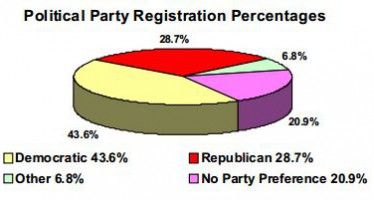Vows To Renew Ageless Marriage Battle
NOV. 30, 2010
By WAYNE LUSVARDI
Now that California voters on Nov. 2 put a full slate of Democrats into every statewide office on the ballot, Democrats are being encouraged by the media and opinion polls to put Prop. 8 – the anti-same sex marriage initiative – back on the ballot for possible defeat if the 9th Circuit Court of Appeals doesn’t overthrow it first in December.
The Los Angeles Times of Nov. 19 shows a photo of attractive same sex model couples waiting in line for marriage licenses with the following story “For state GOP, California is a deep blue hole.” The inference is that gays and the majority of voters just can’t wait to overthrow Prop. 8, the 2008 initiative banning same-sex marriage. Likewise, the Public Policy Institute of California (PPIC) poll of January 2010 purportedly showed a majority of voters then tilted in favor of same sex marriage 50 percent to 45 percent. But the PPIC poll is open to the criticism that it was biased with 41 percent Democrats surveyed and only 25 percent Republicans and an error factor of 2 percent. Republicans got 39 percent of the congressional vote at the November 2, 2010 election.
Prop. 8 was passed in 2008 by a vote of 52 percent to 48 percent, or roughly by 600,000 voters (with 340,000 or 2.5 percent of the ballots declared invalid).
Prop. 8 was later overturned by California appellate Judge Vaughn Walker and was subsequently appealed to the federal 9th circuit court, which has announced it will render a decision in December. The court will likely affirm the judicial overturning of Prop. 8 now that two leftist judges, Stephen Reinhardt and Michael D. Hawkins, have been appointed to the three-judge review panel. Prop. 8 is bound for the U.S. Supreme Court.
The popular argument against Prop. 8 is that it is bigoted against gays and gay marriage, hence the cliché “Prop. 8 is hate.” What Californians may not realize is that the first Republican candidate for U.S. President, John C. Fremont, was from California and in 1856 ran on a platform of anti-racial discrimination and anti-non-traditional marriage. Only then they called it a platform of “anti-slavery and anti-polygamy.” In other words, Republicans, not Democrats, were opposed to bigotry and slave-like marriages forced on young women from polygamous Mormon families.
The first Republicans were progressives and were opposed to what would now be called fundamentalist religious arranged marriages. The Republican platform of 1856 was “free soil, free labor, free speech, free men, and Fremont.” The platform was not only for free men, however, but free women, freed from the bondage of sexual slavery.
Contrary to current media portrayals and popular opinion, today the case in favor of Prop. 8 and for the conventional definition of marriage, as in 1856, is again being made as the progressive option.
Classical liberalism
According to San Francisco Chronicle columnist Debra Saunders, Walter Scheidel, the head of the classics department at Stanford, has filed an affidavit with the 9th Circuit Court of Appeals stating that monogamy is “inextricably entwined with the growth and success of the Western democratic way of life and the development of a rights-based culture.” Scheidel further is reported to say that less developed countries are polygamous countries while developed countries are based on the nuclear family of one man and one woman and children.
Scheidel’s argument is based on classical liberalism, not fundamentalist Protestantism or Catholic Christianity, both of which have been so visibly supportive of Prop. 8 that the public may not know that there are other grounds to oppose same sex marriage than religion or morality.
Forgotten anthropology
Sam Schulman, a Jewish writer and magazine publisher, has outlined an anthropological basis for the progressive legal preservation of conventional marriage.
Schulman says the institution of marriage came about to protect women from “rape, degradation, and concubinage.” To Schulman marriage exists to limit male sexual access to women. A concubine is a woman in a marriage-like relationship with a man whom she cannot marry because she is of a lower status, clan, tribe, ethnicity or nationality. Women captured as part of the spoils of ancient warfare and forced into being the property of high-ranking soldiers or kings were concubines.
Schulman’s position is that same sex marriage is socially regressive toward women and anti-feminist. But Schulman says the reigning media framing of the same sex marriage issue is that any opposition to gay marriage can only be explained by either Biblical literalism or homosexual bigotry.
To Schulman, gay marriage isn’t immoral or wrong as much as it is unnecessary. Schulman states that marriage came about not necessarily to protect children, or to assure a father in the home, but to protect women. Apparently, the courts have long forgotten the anthropological roots of marriage. Even religious institutions have apparently failed to make the feminist case in court regarding Prop. 8 that women need the protection of the law if marriage is going to work in a modern society where choice of marital partner, not fate, is the cultural norm.
Saunders, who admits she could not vote when it came to Prop. 8 because she “couldn’t vote against gay couples” is even now having second thoughts. The Supreme Court in Canada is considering abolishing its law against polygamy due to having legalized same sex marriage.
Misunderstood black vote
Democrats have interpreted the reported 70 percent black vote in California for Prop. 8, affirming the traditional definition of marriage, as due to the fundamentalist Christian upbringing of many blacks (i.e, Southern Baptist). But black Californians reportedly also voted for Prop. 8 at the same 2008 election that they voted for Barack Obama for president in overwhelming numbers.
Those who voted for Lincoln for president in 1860 would understand that a vote for Obama and for Prop. 8 hang together, not apart, as a vote for freedom. Blacks apparently know something about Prop. 8 and traditional marriage that Democrats should listen to instead of dismiss or reduce to the legacy of the Bible Belt. For it is blacks who disproportionately face the threat of family breakdown and the specter of black Muslim marriages that we can learn from.
Power not conciliation
What is perhaps most revealing about the legal contest over Prop. 8 is that religious advocates of Prop. 8 have not conversely supported legalized gay civil unions as reflecting a beneficial desire for more permanent and secure relationships. Likewise, advocates for gay marriage have done nothing to try and legally address the foreseeable unintended consequences of gay marriage such as the legalization of polygamy, child abuse and the socially regressive threat of Muslim Sharia law marriages. Both sides are searching for power, not conciliation. Family and marriage law has historically been used to indirectly reinforce the politically important difference between social classes.
Something like Prop. 8 was on the California ballot of 1856 as the progressive vote against polygamy. U.S. Sen. John C. Fremont from California did not win the presidency but in 1860 Abraham Lincoln became the first Republican president on a platform of anti-slavery and anti-polygamy. Is it surprising 150 years later that California Democrats now want to overturn it but blacks don’t?
Related Articles
‘No Party Preference’ gains in CA voter registrations
“No Party Preference” continues its gradual rise in voter registrations according to new data released today by California Secretary of
State-run retirement program may massively expand federal equivalent
State officials in charge of implementing a new state-run retirement program are considering using the federal MyRA program temporarily, which
New California in-car cellphone crackdown begins
Amid lingering criticism and doubts about the feasibility of enforcement, Californians braced for new legislation taking effect in January that




